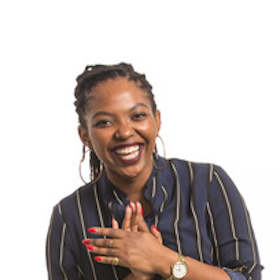 Hometown: Soweto, South Africa
Hometown: Soweto, South AfricaGraduating Class: 2018
Current Profession: Development Consultant and Product Manager
What languages did you study at UNC and what were your most memorable moments from those global language courses?
I studied Kiswahili for all four years of my undergraduate degree. The most memorable moment was an internal one as I realised that increasingly, when I entered the classroom, I was no longer mentally translating from my home languages of SeSotho and English to Kiswahili to converse with my professor or classmates. Instead, I was hearing, understanding, and responding intuitively in Kiswahili.
Did you study abroad or do an internship abroad and, if so, what about these experiences impacted your bachelor’s degree the most?
I studied abroad in London without a language component and I missed engaging in language and literature a lot. I was nervous my Kiswahili would be shaky upon my return to Carolina but having three lessons a week gets you back on track very quickly.
How did the study of Swahili shape your overall academic training at Carolina?
Learning Swahili was quite a formative part of my undergraduate degree. Kiswahili lessons were a meeting space for me and my new friends. I was able to make friends studying completely different disciplines than mine and people studying at other universities. If we didn’t have Kiswahili class in common, our paths would have never crossed. I’m grateful for that.
How has language study at Carolina shaped your outlook and professional aspirations following graduation?
Immediately after graduation, I worked across Africa in my capacity as a development consultant and product manager. It has given me a significant competitive advantage when it comes to projects based in east Africa that I’ve had four years of Kiswahili training. I’ve also felt far more comfortable navigating east Africa – particularly Kenya – as a result of my language study. It’s been incredibly empowering.
What would you want to say to students who want to learn an African language? Why should they learn and study an African language?
Africa has the fastest growing population in the world, most of it being youth. If you want to be able to tap into this “demographic dividend”, you’ll need the tools to connect with a large portion of Africans in an authentic, useful, and practical way. The mere proportion of Africans who speak Kiswahili made it an obvious choice for me. I’d encourage students looking to learn an African language at Carolina to jump in as the structural support is tremendous: the number of classes per week, the small class size, and the consistency of approach (to name a few) mean that walking in knowing absolutely nothing about the language or culture will very quickly become a non-issue.
Is there anything else you’d like to add that you believe new students should know about your global language experience at Carolina?
Finding native speakers on campus and learning what some more colloquial ways of speaking the language you’re learning formally can be fun and interesting.
